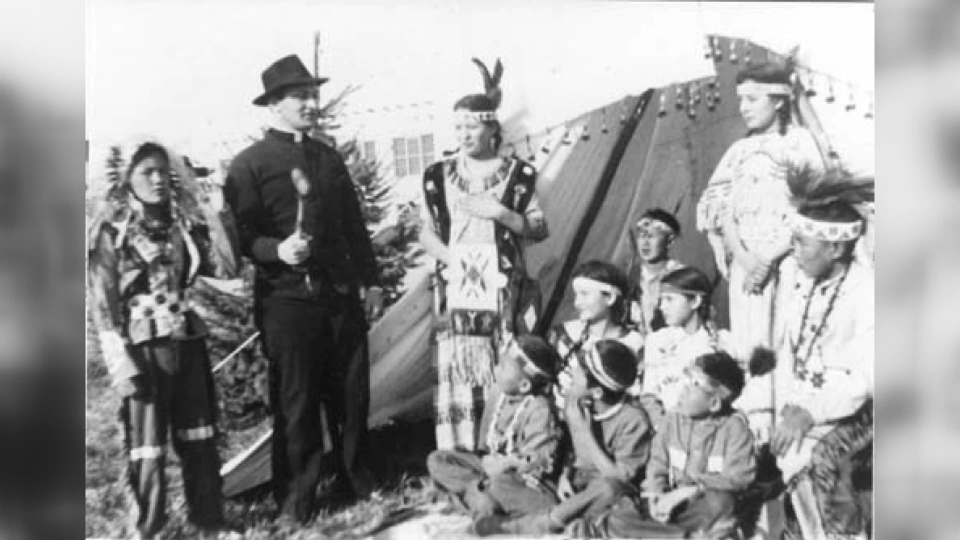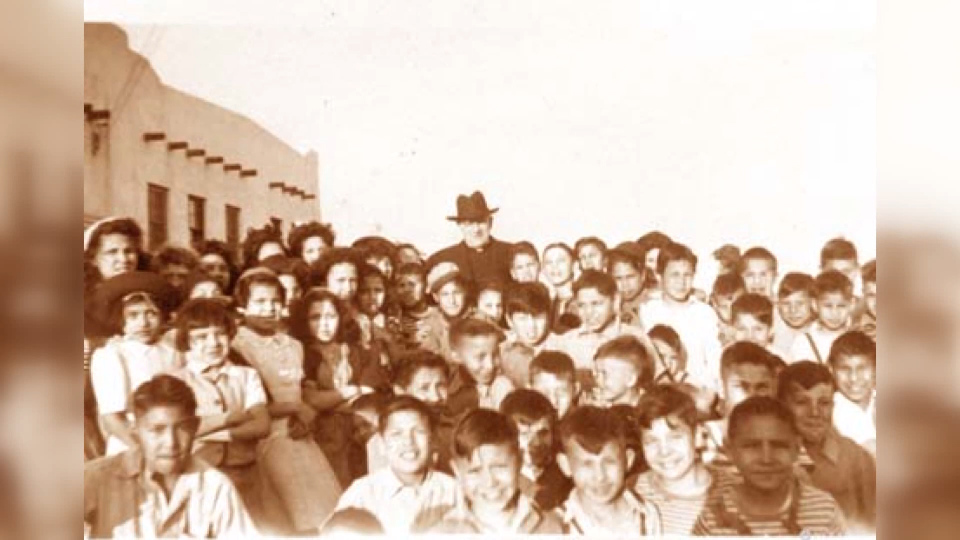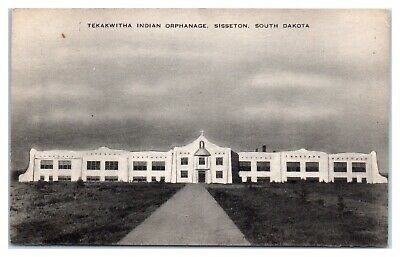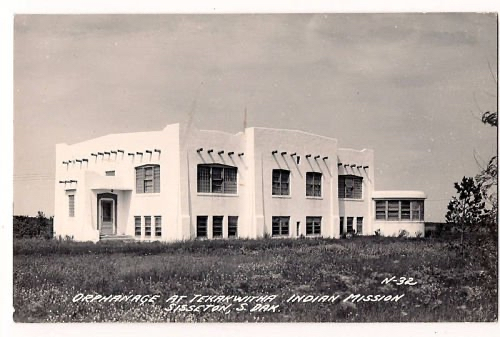SISSETON (SD)
Keloland Media Group [Sioux Falls SD]
July 19, 2021
By Lauren Soulek
SISSETON, S.D. (KELO) – As the U.S. Secretary of the Interior Deb Haaland launches the Federal Indian Boarding School Initiative; and the remains of nine Native American children return home to the Rosebud Sioux Tribe from the Carlisle Boarding School — a dark piece of our country’s history comes to light, as reports of indoctrination and abuse at these schools have come to surface.
For more than half a century, the Tekakwitha boarding school and orphanage operated in Sisseton, South Dakota. Native American children attended the school from the 1940s to the 70s.
It wasn’t until about ten years ago that the buildings were demolished and the land was turned into a park.
“Here is where the papoose house was, which is where they kept the babies,” Allison Renville, SWO PIO said. “And connected to the papoose house was a tunnel system that led to this property here, which was the, it was the bigger, longer, building. That was the dormitory, classrooms and living quarters for some of the clergymen.”
Father John Pohlen started the Catholic boarding school in Sisseton.

Before it opened, Lillian Owen remembers him going to three churches in town.
“Every other Sunday, you know, he would go to one of those. That’s how he knew the people, how we lived,” Owen said.
When she was nine years old, Owen says Pohlen would take her and other children to a Catholic boarding school in Stephan, on the Crow Creek Reservation. The kids would travel more than 200 miles to school in the back of a covered truck.
“There, we got up, six o’clock every morning,” Owen said. “Every morning we went to church, that’s how we learned. Rain, blizzard, snow, anything, we still go.”
By the time she started the fifth grade, Pohlen had built the Tekakwitha boarding school and orphanage in Sisseton. Owen was one of the first students.
“He wanted, I think his idea was that, instead of going way over there two, three hundred miles away, he wanted kids to be here, you know, with their parents. So that’s how he started that school,” Owen said.
After graduating from Tekakwitha in the 8th grade, Owen went back to Stephan, South Dakota, for high school. After that graduation, she came back to work for Father Pohlen at Tekakwitha hospital. Pohlen also had Owen and other girls clean his house.
“That’s how he’s teaching us how to keep clean, keep things clean,” Owen said. “So it was my turn so I went and in his bedroom, we used to have to make his bed, change sheets. Oh, he was the cleanest priest I ever saw. We had to even iron his shorts.”
Owen remembers Pohlen as being a good man.
“You know, people think, you know, he’s mean to kids,” Owen said. “He’s not. He’s not at all, I could say that thousands of times and he’s not that.”
“There are a lot of reports of capital punishment, where, you know, they were given ‘lickings.’ I had multiple elders tell me that’s what they referred to punishment as,” Renville said.
But Owen’s experience is not shared by many others who attended Tekakwitha.

“And that they would be lined up along the wall, if not taken into private and paddled really hard where they would have bruises and welts up and down their leg,” Renville said.


Allison Renville is the public information officer for the Sisseton Wahpeton Oyate. While asking elders if they’d like to be interviewed for this story, many preferred to tell their stories anonymously.
“A lot of our members that suffered through these times, you know, they’re elders now and, unfortunately, due to the stigma behind sexual abuse in American culture, it’s hard for them to come forward and they told these stories to me anonymously,” Renville said.
Renville listened to their stories and shared six of them with KELOLAND News. These anonymous elders were at Tekakwitha between the 50s and 70s.
One woman said she was abused by the nuns and forced to perform sexual acts on them using toys they were given for the holidays. Another remembers children being left in the cribs crying ‘for what seemed like forever’ because no one would come to check on them.
One man shared that he was dyslexic and the nuns would whip his hands and eyes and accused him of faking his disability. He also spoke of sexual abuse that would happen in the bathrooms at the hands of the priests.
Other women remember having to wear specific clothing and have their hair cut to look identical to one another.
“Honestly, when you hear what some of our tribal members went through, I don’t even know how they’re still standing,” Dionne Crawford, Lake Traverse Council Representative said. “I don’t know how you could go through the things that some of our people went through and still be breathing even. It was so complete. The oppression on those individuals was so complete.”
Pohlen died in 1969. Over the years his order has denied any knowledge of abuse, saying it’s nearly impossible to determine if the claims of abuse are accurate because it was so long ago and the children were so young.
The land where Tekakwitha stood has since become a park where the Sisseton Wahpeton Oyate children can play and events, like this one from January of this year, can honor the children who suffered in the boarding school and orphanage.
Tekakwitha was also an orphanage. It’s been reported that children there were adopted out to families for prices of $10 or $15 and the names on their birth certificates would be changed.
William Fish’s dad, Daniel, was one of those children.
“My grandparents had my father in August of 1948 and it was a really hot summer that summer,” William Fish said. “They were in the middle of building a house, from what I was told, and they didn’t want to have an infant literally going from house to house while their house is being built. So they put him in the orphanage thinking they would pick him up in three or four months. And when they went back to pick him up, he was gone.”
His father went to a family in Watertown for $15 and the name on his birth certificate was changed.
[VIDEO – When I think of that, I think, is that really how much a child’s life costed in 1948? – William Fish]
William says his father was lucky though, because the family he went to was well-respected and good to him. William himself is close with that family. However, his dad passed away when William was only 11 not ever knowing his Native American family and culture.
[VIDEO – Honestly, I just wish that he would’ve at least met them.– William Fish]
It wasn’t until the 90s that William began to be able to piece together his biological family history thanks to a BIA agent helping him.
“You go from one night you have like six, seven, eight cousins to like three hundred. You know what I mean? It was crazy. It was like something you’d see on unsolved mysteries,” he said.
Some of the nuns who were associated with Tekakwitha Boarding School and Orphanage were members of the Sisters of the Divine Savior out of Milwaukee, Wisconsin. They sent this statement to KELOLAND News via email:
“The Sisters of the Divine Savior are and continue to be committed to the prevention of child abuse in all its forms. In 2010, we were shocked and greatly saddened to learn that former residents of the Tekakwitha School claimed that they suffered sexual abuse there. We know very little about what actually happened at the School so many years ago, as some of the charges are nearly 80 years old and nearly all the Sisters who served there between 1940 and 1973 are deceased.
Over the time our Sisters served at the School at the request of the OMI Fathers, as well as in other schools and facilities in our history of service, these complaints of sexual abuse are the only such reports we have received. We continue to ensure all our Sisters in ministry receive training to enhance understanding of their responsibility for the protection of minors, the prevention of sexual abuse, and reporting requirements. We have been praying for everyone involved in this case and all victims and survivors of abuse. Beyond prayer, we reestablished a mission ministry in Sisseton a few years ago to provide services in that community directly.“
– Jan Penlesky, Director of Communications for the Sisters of the Divine Savior
